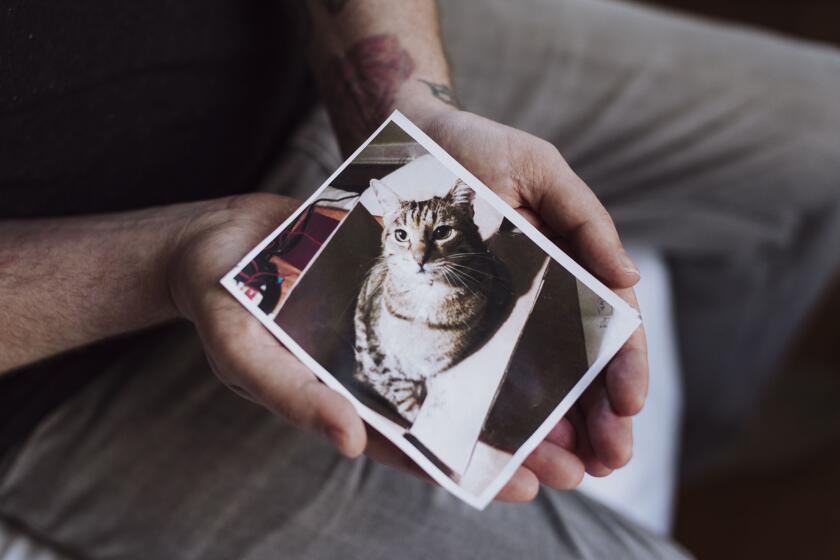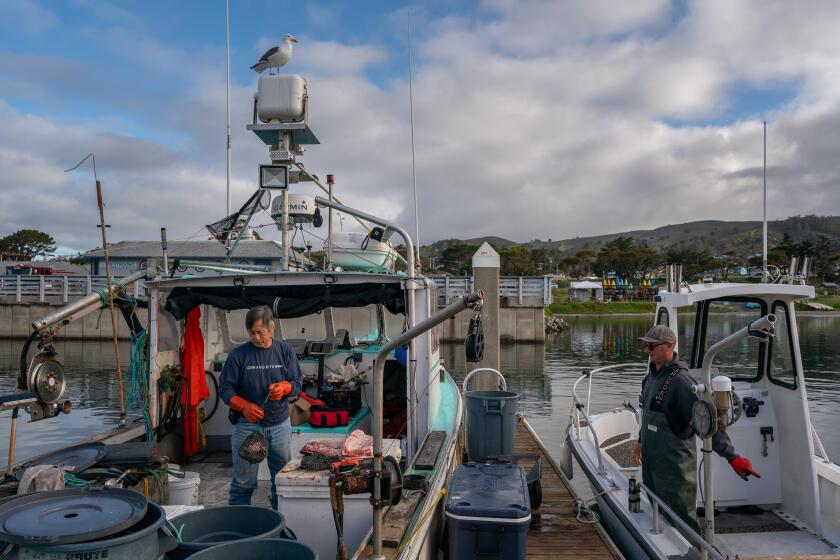Animal Rights Leader Justifies Violence
One of the leading animal rights activists in the Los Angeles area has taken his campaign to the national stage in recent weeks, saying that it may be “morally justifiable” to kill people to stop medical research on animals.
In recent U.S. Senate testimony and in a “60 Minutes” interview that will air tonight on CBS-TV Channel 2, Dr. Jerry Vlasak, a trauma surgeon, said he believes that researchers, slaughterhouse workers and others who kill animals “should be stopped using whatever means necessary.”
Vlasak is a board member of Animal Defense League, which has held raucous protests in the last few years outside the homes of city animal services employees and the residences of Mayor Antonio Villaraigosa and former Mayor James K. Hahn.
The group has demanded that the city stop euthanizing animals at the city’s six shelters -- nearly 25,000 dogs were killed in the last fiscal year -- and that Villaraigosa live up to his campaign promise to fire Guerdon Stuckey, the general manager who oversees the animal services department.
The “60 Minutes” segment focuses on the role of activists, including Vlasak, in fighting medical research on animals. The segment is not about the situation in Los Angeles.
According to a transcript provided by CBS, when reporter Ed Bradley suggests that Vlasak is advocating murder, Vlasak replies: “I think people who torture innocent beings should be stopped. If they won’t stop when you ask them nicely, they don’t stop when you demonstrate to them what they’re doing is wrong, then they should be stopped using whatever means necessary.”
Vlasak also tells Bradley that he would not resort to violence.
“My role in the movement is not to go out and do that,” he says, “but to explain to the mainstream media and to the public in general why these people are doing what they’re doing.”
Last month, at a Senate committee hearing on medical research on animals, Sen. James Inhofe (R-Okla.) asked Vlasak to clarify if “whatever means necessary” included murder.
“That would be a morally justifiable solution to the problem,” Vlasak responded.
He has made similar remarks in the past. Last year, Vlasak was banned from Britain because officials there said he was endorsing violence.
In an interview with The Times, Vlasak, 47, said he is on the staff of several hospitals, but declined to name them.
He is married to another of the city’s most prominent animal activists, Pamelyn Ferdin, who is the co-leader of the Animal Defense League. In the 1960s and early ‘70s, Ferdin was a child actor, best known as the voice of Lucy on the “Charlie Brown” television cartoon shows.
Vlasak said that Ferdin initially got involved in protesting the killing of wolves in Alaska and then introduced him to the broader field of animal activism.
The turning point for Vlasak, he said, was reading the book “Diet for a New America,” about factory farming.
While living on the East Coast, he joined the Sea Shepherd Conservation Society, a group known for using its ship to interfere with the fishing industry and seal and whale hunts.
Vlasak said that his recent comments were not intended to endorse violence in the group’s campaign in Los Angeles. “I think we have a reasonable chance of succeeding using nonviolent means,” he said.
Vlasak said that he was trying to explain that violence is often inevitable in any battle for freedom. “Anyone fighting for their own liberation has had to use violence at some stage of the struggle, and I don’t think animal independence is any different,” he said.
Informed of Vlasak’s comments on “60 Minutes,” Stuckey, the city’s animal services chief, said he feared that activists might harm one of his employees.
“It’s no different than Osama bin Laden,” Stuckey said. “He doesn’t strap a bomb to his chest and kill people on the bus, but he’s the catalyst that encourages others to do that.”
Stuckey also said that neither Vlasak nor the defense league is doing anything to cure animal overpopulation, provide spay and neuter services or combat illegal breeding.
The mayor’s office declined to comment on Vlasak’s remarks.
In late October, Villaraigosa met with Vlasak, Ferdin and another league member in his City Hall offices. In a contentious 45-minute session, the mayor criticized the protests and refused to fire Stuckey as long as activists continued to demonstrate near the homes of city employees. Eight days later, the group protested outside the mayor’s Mount Washington residence.
The league mailed graphic videos of dogs being killed at shelters to the homes of City Council members. That week, the council decided to lend surveillance equipment to city employees threatened by animal activists.
While the Animal Defense League harasses city officials, another group known as the Animal Liberation Front has claimed responsibility for several acts of vandalism at the home of shelter employees. The front also has claimed responsibility for arsons across the United States and is listed as a terrorist organization by the U.S. Department of Justice.
Most recently, the group took responsibility for throwing smoke grenades into the hallway of the Bunker Hill apartment building where Stuckey lives.
Vlasak often passes along the Animal Liberation Front’s communiques to the media, but he has long insisted that he is not a member and does not take part in that group’s activities.
Madeline Bernstein, president of the local chapter of the Society for the Prevention of Cruelty to Animals, criticized Vlasak’s remarks.
“I don’t think it helps any of us if the general public -- whose support we want -- thinks that any one of us is capable of throwing smoke grenades or murdering people who disagree with us,” she said. But Bernstein, who was on a search committee that recommended Stuckey, also believes that Villaraigosa worsened the situation by raising activists’ hopes that he would fire Stuckey.
Vlasak said that he does not worry that his comments will cause people to dismiss him as an extremist.
“I’m not that concerned about personal fortunes -- maybe part of it is that I see people die every day at work,” he said. “Life is fragile and I feel like I have a message. I abhor the suffering of animals. I’m not encouraging anyone to get violent; I’m just looking for what works.”
More to Read
Start your day right
Sign up for Essential California for news, features and recommendations from the L.A. Times and beyond in your inbox six days a week.
You may occasionally receive promotional content from the Los Angeles Times.






